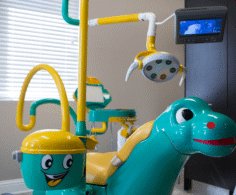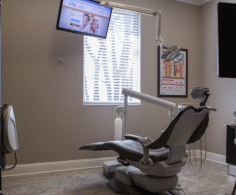Dental Implants Royse City
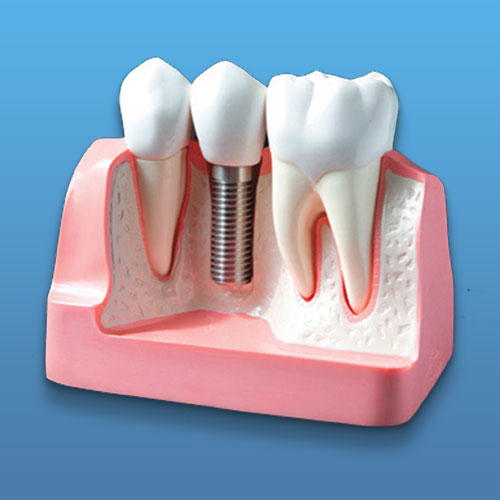 During the last 20 years, dental implants have become a desirable alternative to other methods of replacing missing teeth. Thanks to their high success rates (90% and higher) after 20 years and a range of available restoration options, dentists and patients alike trust implant-supported restorations to fully renew their smiles. At Fate Family Dental, our skilled implant dentist, Dr. Andy Davong, offers a variety of new ways to treat and replace lost teeth. Dental implants play an essential role in restorative dentistry. Because they are permanent prosthetics that are both natural-looking and cosmetically appealing, dental implant supported tooth replacement can be used for full-mouth restorations. If you’re ready to get started, contact Fate Family Dental in Royse City to schedule a tooth replacement consultation with our team. During this consultation visit, we’ll review all of your tooth replacement options to ensure you have a personalized treatment plan that meets your needs and exceeds your highest expectations.
During the last 20 years, dental implants have become a desirable alternative to other methods of replacing missing teeth. Thanks to their high success rates (90% and higher) after 20 years and a range of available restoration options, dentists and patients alike trust implant-supported restorations to fully renew their smiles. At Fate Family Dental, our skilled implant dentist, Dr. Andy Davong, offers a variety of new ways to treat and replace lost teeth. Dental implants play an essential role in restorative dentistry. Because they are permanent prosthetics that are both natural-looking and cosmetically appealing, dental implant supported tooth replacement can be used for full-mouth restorations. If you’re ready to get started, contact Fate Family Dental in Royse City to schedule a tooth replacement consultation with our team. During this consultation visit, we’ll review all of your tooth replacement options to ensure you have a personalized treatment plan that meets your needs and exceeds your highest expectations.
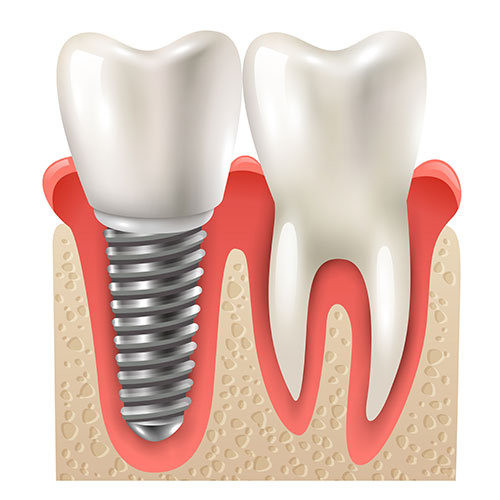 How are Dental Implants Used?
How are Dental Implants Used?
Unlike other tooth replacement solutions, dental implant supported restorations repair both the roots and visible portions of teeth. Depending on the number and location of missing teeth, one or more dental implant posts can be utilized to replace any number of missing teeth. In most cases, we will recommend one of the following solutions:
Single Tooth Implant Supported Dental Crowns
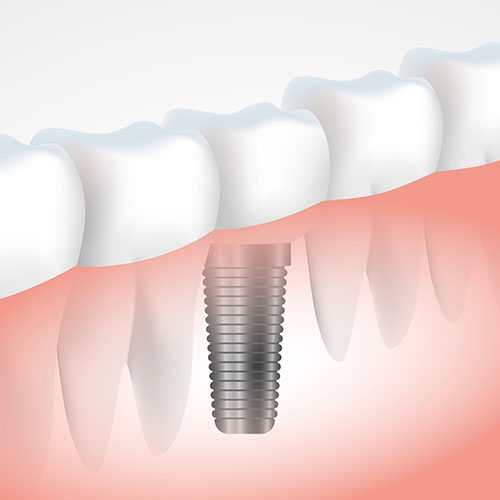 Many people think they don’t need to replace just one lost tooth, especially if the tooth isn’t visible when they smile. However, even a single lost tooth allows surrounding teeth to shift, resulting in an unsightly appearance and diminished oral health. In the past, bridges were the preferred method single tooth replacement, but surrounding teeth had to be damaged in order to support these prosthetics. As an alternative, many patients seek dental implants as a means of improving both function and cosmetic appearance following the loss of a single tooth. An implant-supported dental crown has the look, feel, and function of a natural tooth.
Many people think they don’t need to replace just one lost tooth, especially if the tooth isn’t visible when they smile. However, even a single lost tooth allows surrounding teeth to shift, resulting in an unsightly appearance and diminished oral health. In the past, bridges were the preferred method single tooth replacement, but surrounding teeth had to be damaged in order to support these prosthetics. As an alternative, many patients seek dental implants as a means of improving both function and cosmetic appearance following the loss of a single tooth. An implant-supported dental crown has the look, feel, and function of a natural tooth.
Multiple Tooth Dental Implant Supported Bridges & Partial Dentures
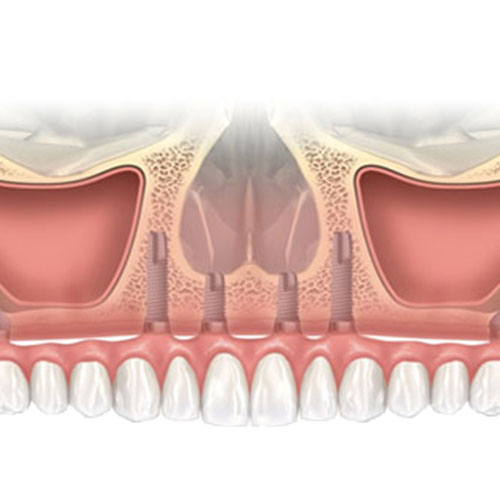 For those who have lost two or more consecutive missing teeth, an implant-supported dental bridge may be the best option. Traditional brides attach to teeth on either side of the lost tooth, but an implant retained bridge is affixed to two implant posts, protecting your healthy, natural tooth structure. To restore both consecutive and nonconsecutive missing teeth, we can use just two to four dental implant posts to support a partial denture.
For those who have lost two or more consecutive missing teeth, an implant-supported dental bridge may be the best option. Traditional brides attach to teeth on either side of the lost tooth, but an implant retained bridge is affixed to two implant posts, protecting your healthy, natural tooth structure. To restore both consecutive and nonconsecutive missing teeth, we can use just two to four dental implant posts to support a partial denture.
Full Mouth Dental Implant Supported Tooth Replacement
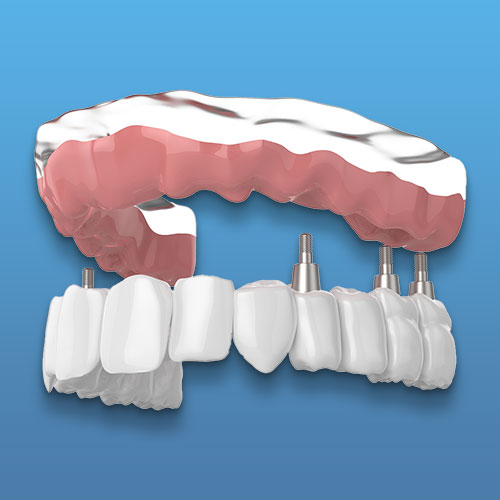 In some cases, all of a patient’s teeth need to be replaced due to decay or other oral health complications. The teeth are vital to communication and digestion, so following complete tooth loss, replacement is no longer a matter of cosmetics and maintaining optimal oral health. It’s now a necessity. Options for full mouth restoration are limited to removable dentures or dental implant supported dentures. More and more patients are choosing implants over traditional dentures, as they provide a permanent solution that requires less maintenance and also preserves more of the natural maxillofacial bones surrounding the teeth, allowing patients to eat their favorite foods and smile with confidence.
In some cases, all of a patient’s teeth need to be replaced due to decay or other oral health complications. The teeth are vital to communication and digestion, so following complete tooth loss, replacement is no longer a matter of cosmetics and maintaining optimal oral health. It’s now a necessity. Options for full mouth restoration are limited to removable dentures or dental implant supported dentures. More and more patients are choosing implants over traditional dentures, as they provide a permanent solution that requires less maintenance and also preserves more of the natural maxillofacial bones surrounding the teeth, allowing patients to eat their favorite foods and smile with confidence.
Do I Qualify for Dental Implants?
 Your dentist will need to evaluate your individual case in order to tell you if you are a good candidate for dental implants. Thanks to improvements in materials, technologies, and treatment methods, more people than ever can receive an implant supported replacement tooth or teeth. Most patients with adequate bone mass and gum tissue density can receive dental implants. Typically, an x-ray and CT scan are performed to determine if you have enough bone to place the implant, as well as verifying the size and kind of dental implant that should be placed. We may also ask that you speak with your general physician to ensure there are no additional medical concerns that could impact your ability to successfully undergo the implant tooth replacement process.
Your dentist will need to evaluate your individual case in order to tell you if you are a good candidate for dental implants. Thanks to improvements in materials, technologies, and treatment methods, more people than ever can receive an implant supported replacement tooth or teeth. Most patients with adequate bone mass and gum tissue density can receive dental implants. Typically, an x-ray and CT scan are performed to determine if you have enough bone to place the implant, as well as verifying the size and kind of dental implant that should be placed. We may also ask that you speak with your general physician to ensure there are no additional medical concerns that could impact your ability to successfully undergo the implant tooth replacement process.
What is the Dental Implant Process?
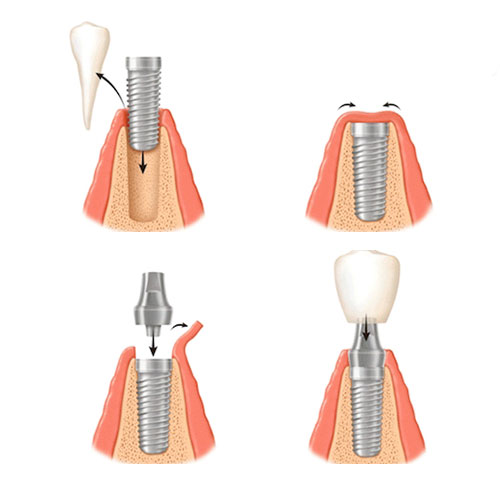 Structurally, a dental implant is a cylinder that replaces the missing tooth root. In most cases, we utilize traditional titanium to ensure success, but we may also recommend zirconia or a different material, depending on your unique oral healthcare needs. Before placing the dental implant post or posts, we may prepare your smile by increasing bone density or gum volume with a hard or soft tissue graft. If the damaged tooth or teeth need to be removed prior to implant placement, we can also provide this service. After your implants are in place, it can take three to six months for the implants to fully fuse with the supportive structures. Once this process, called osseointegration, is complete, we will attach abutments. These are the connector pieces that anchor your replacement tooth or teeth to the implants. Then, we design your dental crown, bridge, or denture. Once the lab returns your restoration, we’ll attach it to the implant posts, creating a flawless smile.
Structurally, a dental implant is a cylinder that replaces the missing tooth root. In most cases, we utilize traditional titanium to ensure success, but we may also recommend zirconia or a different material, depending on your unique oral healthcare needs. Before placing the dental implant post or posts, we may prepare your smile by increasing bone density or gum volume with a hard or soft tissue graft. If the damaged tooth or teeth need to be removed prior to implant placement, we can also provide this service. After your implants are in place, it can take three to six months for the implants to fully fuse with the supportive structures. Once this process, called osseointegration, is complete, we will attach abutments. These are the connector pieces that anchor your replacement tooth or teeth to the implants. Then, we design your dental crown, bridge, or denture. Once the lab returns your restoration, we’ll attach it to the implant posts, creating a flawless smile.
What are the Benefits of Dental Implants?
 When compared to fixed bridges and removable dentures supported by other teeth or gum tissue, implants offer numerous advantages:
When compared to fixed bridges and removable dentures supported by other teeth or gum tissue, implants offer numerous advantages:
- Better esthetics: Since implants are placed in the gum, they function as a tooth root, supporting replacement teeth and providing natural appearance and function.
- Reduction of bone resorption: When a tooth is lost, the supporting bone structure gradually recedes. Placing an implant in that empty space significantly reduces the speed of bone resorption.
- Retention: Patients who have experienced removable full or partial dentures know that keeping their dentures in place is a challenge. Dental implants offer a great improvement to denture retention. In some cases, the denture can be secured to a group of implants with special screws that stabilize the denture completely, recreating your healthy smile function.
- Preserving natural tooth structure: Often the preferred method of replacing a single missing tooth is a bridge. Bridges require extra preparation, which negatively impacts your oral health through the destruction of existing tooth structure to create room for the new bridge. An implant is an independent unit and does not negatively affect the adjacent teeth.
How Do You Make Dental Implants Affordable?
 Unfortunately, the majority of dental insurance providers do not offer coverage for the cost of your dental implant posts or their surgical placement. At Fate Family Dental, we are very familiar with the ins and outs of dental insurance benefits and how they relate to implant supported tooth replacement. That means we can easily help you make the most of your available insurance coverage for other aspects of the treatment plan, including your replacement tooth or teeth and preparatory procedures like tooth extraction and bone or soft tissue grafting. We also partner with third-party financiers like CareCredit to offer affordable payment plans that fit the cost of implant tooth replacement into almost any budget.
Unfortunately, the majority of dental insurance providers do not offer coverage for the cost of your dental implant posts or their surgical placement. At Fate Family Dental, we are very familiar with the ins and outs of dental insurance benefits and how they relate to implant supported tooth replacement. That means we can easily help you make the most of your available insurance coverage for other aspects of the treatment plan, including your replacement tooth or teeth and preparatory procedures like tooth extraction and bone or soft tissue grafting. We also partner with third-party financiers like CareCredit to offer affordable payment plans that fit the cost of implant tooth replacement into almost any budget.
Questions? Ask the staff or Dr. Davong




